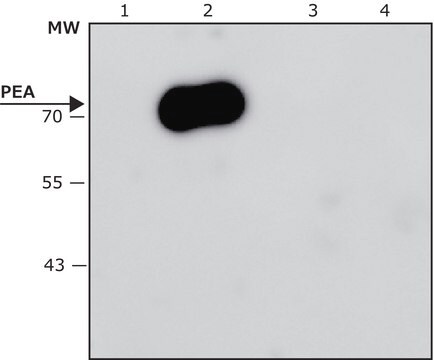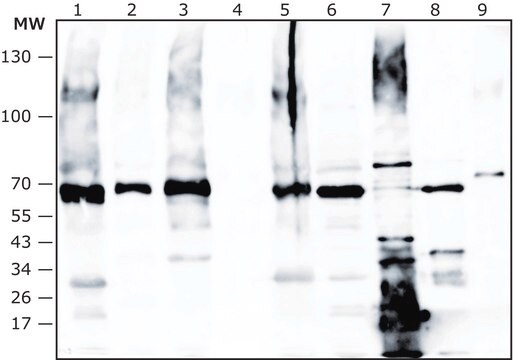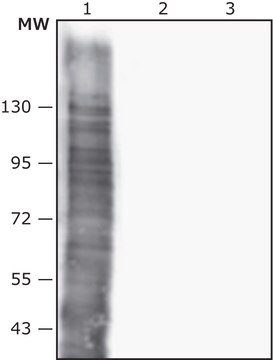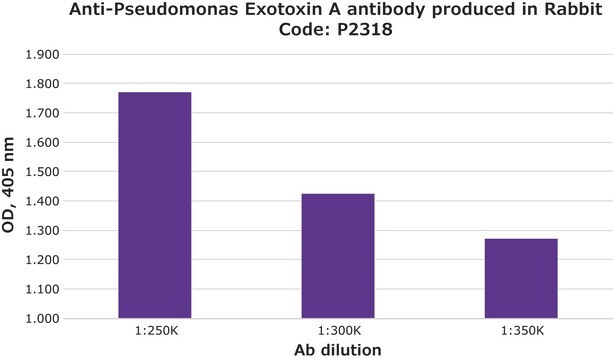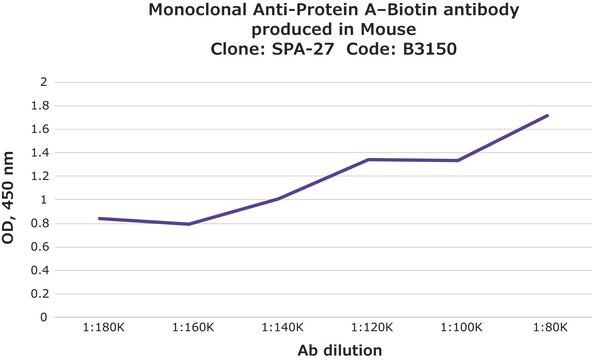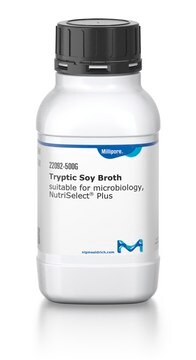추천 제품
생물학적 소스
rabbit
Quality Level
항체 형태
IgG fraction of antiserum
항체 생산 유형
primary antibodies
양식
liquid
종 반응성
Pseudomonas aeruginosa
포장
pkg of 100 μL
pkg of 25 μL
농도
~1 mg/mL
기술
immunoblotting: 1:10,000-1:20,000 using P.aeruginosa lysate
indirect ELISA: 1:5000- 1:0,000 using whole dead P.aeruginosa bacteria for coating
배송 상태
dry ice
저장 온도
−20°C
타겟 번역 후 변형
unmodified
일반 설명
Pseudomonas aeruginosa is a rod shaped, gram negative, monoflagellated, aerobic to facultative anaerobe bacteria which commonly inhabits soil and aqueous environments.1,2 P.aeruginosa is considered an opportunistic human pathogen mainly causing disease in immunocompromised patients. It is especially fatal in cystic fibrosis (CF) patients, but also presents a major problem in chronic wounds, burn wounds and infection of implanted biomaterials such as catheters.3P. aeruginosa is a major cause of nosocomial infections which affect more than 2 million
patients every year and are accounted for around 90,000 deaths annually.3
It forms highly resistant biofilms on human tissues such as the lungs of CF patients or medical surfaces. Once P. aeruginosa infection is established it is extremely hard to eradicate.3
The genome of P. aeruginosa encodes a vast arsenal of virulence factors. However, the P. aeruginosa isolated from chronic infections expresses less virulence factors in comparison to isolates from acute infections but more readily form biofilms.1,4-6
patients every year and are accounted for around 90,000 deaths annually.3
It forms highly resistant biofilms on human tissues such as the lungs of CF patients or medical surfaces. Once P. aeruginosa infection is established it is extremely hard to eradicate.3
The genome of P. aeruginosa encodes a vast arsenal of virulence factors. However, the P. aeruginosa isolated from chronic infections expresses less virulence factors in comparison to isolates from acute infections but more readily form biofilms.1,4-6
특이성
Anti-P. aeruginosa antibody recognizes P. aeruginosa whole dead bacteria and lysate, the antibody has no cross reactivity with whole dead bacteria or lysate of Proteus mirabilis, Porphyromonas gingivalis, E. coli, Shigella flexneri, Enterococcus faecalis, Akkermansia muciniphila or Salmonella enterica.
애플리케이션
The antibody may be used in various immunochemical techniques including Immunoblotting and ELISA. Detection of the P. aeruginosa bands by Immunoblotting is specifically inhibited by the immunogen.
생화학적/생리학적 작용
P. aeruginosa cells possess a single flagellum and type 4 pili that are important for adhesion to the host epithelial cells, motility and can also initiate an inflammatory response.1 After adhesion, P. aeruginosa activates Type 3 secretion system (T3SS) and injects cytotoxins into the host cell.1 Moreover, P. aeruginosa secretes several proteases, which can degrade host complement, mucins, and disrupt tight junctions6-7,. In addition to lipases and phospholipases, that degrade lipids in host cell membranes6, and expresses Lipopolysaccharide (LPS), that is involved in inflammatory response and antibiotic resistance8.
Antibiotic resistance to many classes of antibiotics is a major challange in P. aeruginosa treatment. P. aeruginosa possesses several resistance mechanisms such as, low permeability of the outer membrane,
expression of membrane efflux (Mex) pumps, and ß-lactamase and AmpC that hydrolases ß-lactam antibiotics such as, penicillin9. In addition, as a result of genetic transfer new resistant strains emerge constantly. Therefore, finding new prevention and treatment strategies for P. aeruginosa infection is of high importance.1
Antibiotic resistance to many classes of antibiotics is a major challange in P. aeruginosa treatment. P. aeruginosa possesses several resistance mechanisms such as, low permeability of the outer membrane,
expression of membrane efflux (Mex) pumps, and ß-lactamase and AmpC that hydrolases ß-lactam antibiotics such as, penicillin9. In addition, as a result of genetic transfer new resistant strains emerge constantly. Therefore, finding new prevention and treatment strategies for P. aeruginosa infection is of high importance.1
물리적 형태
Supplied as a solution in 0.01 M phosphate buffered saline pH 7.4, containing 15 mM sodium azide as a preservative.
저장 및 안정성
For continuous use, store at 2-8°C for up to one month. For extended storage, freeze in working aliquots. Repeated freezing and thawing is not recommended. If slight turbidity occurs upon prolonged storage, clarify the solution by centrifugation before use. Working dilution samples should be discarded if not used within 12 hours.
면책조항
Unless otherwise stated in our catalog our products are intended for research use only and are not to be used for any other purpose, which includes but is not limited to, unauthorized commercial uses, in vitro diagnostic uses, ex vivo or in vivo therapeutic uses or any type of consumption or application to humans or animals.
적합한 제품을 찾을 수 없으신가요?
당사의 제품 선택기 도구.을(를) 시도해 보세요.
Storage Class Code
12 - Non Combustible Liquids
WGK
WGK 1
Flash Point (°F)
Not applicable
Flash Point (°C)
Not applicable
가장 최신 버전 중 하나를 선택하세요:
Alexander J Laarman et al.
Journal of immunology (Baltimore, Md. : 1950), 188(1), 386-393 (2011-12-02)
The complement system rapidly detects and kills Gram-negative bacteria and supports bacterial killing by phagocytes. However, bacterial pathogens exploit several strategies to evade detection by the complement system. The alkaline protease (AprA) of Pseudomonas aeruginosa has been associated with bacterial
Tanya Strateva et al.
Journal of medical microbiology, 58(Pt 9), 1133-1148 (2009-06-17)
Pseudomonas aeruginosa is one of the leading nosocomial pathogens worldwide. Nosocomial infections caused by this organism are often hard to treat because of both the intrinsic resistance of the species (it has constitutive expression of AmpC beta-lactamase and efflux pumps
Eric E Smith et al.
Proceedings of the National Academy of Sciences of the United States of America, 103(22), 8487-8492 (2006-05-12)
In many human infections, hosts and pathogens coexist for years or decades. Important examples include HIV, herpes viruses, tuberculosis, leprosy, and malaria. With the exception of intensively studied viral infections such as HIV/AIDs, little is known about the extent to
Jerry D King et al.
Innate immunity, 15(5), 261-312 (2009-08-28)
Pseudomonas aeruginosa causes serious nosocomial infections, and an important virulence factor produced by this organism is lipopolysaccharide (LPS). This review summarizes knowledge about biosynthesis of all three structural domains of LPS - lipid A, core oligosaccharide, and O polysaccharides. In
D J Hassett
Journal of bacteriology, 178(24), 7322-7325 (1996-12-01)
Pseudomonas aeruginosa produced alginate and elevated algD (encoding GDPmannose 6-dehydrogenase) transcription under strict anaerobic conditions, especially when using nitrate as a terminal electron acceptor. Purified alginate added to bacterial suspensions caused a decrease in growth, suggesting that alginate contributes to
Global Trade Item Number
| SKU | GTIN |
|---|---|
| SAB4200866-100UL | |
| SAB4200866-25UL |
자사의 과학자팀은 생명 과학, 재료 과학, 화학 합성, 크로마토그래피, 분석 및 기타 많은 영역을 포함한 모든 과학 분야에 경험이 있습니다..
고객지원팀으로 연락바랍니다.